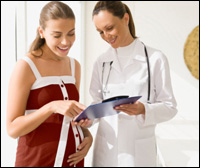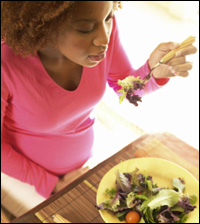Protect Your Unborn Baby or Newborn from Infections
 If you're pregnant or planning a pregnancy, there are simple steps you can take to protect your unborn baby or newborn from infections that cause serious health problems.
If you're pregnant or planning a pregnancy, there are simple steps you can take to protect your unborn baby or newborn from infections that cause serious health problems.

Ask your healthcare provider for a group B strep test when you are 35–37 weeks pregnant.
Group B Strep
If you are pregnant—or know anyone who is—you need to know about group B strep. About a quarter of all women carry the bacteria that cause group B strep infection. Group B strep bacteria are usually not harmful to you and won't make the people around you sick. But these bacteria can be very dangerous for your newborn. Babies can get very sick and even die if their mothers pass group B strep bacteria to them during childbirth. That's why it's so important for you to get tested for group B strep each time you get pregnant.
If you are pregnant and test positive for group B strep, doctors can give you an antibiotic (usually penicillin) during labor that prevents the bacteria from spreading to your baby. If you think you might go into labor early, talk with a health care provider as soon as possible.
Remember:
- Ask your healthcare provider for a group B strep test when you are 35–37 weeks pregnant.
- If the test shows that you carry the bacteria, talk with a health care provider. Be sure to tell them if you are allergic to penicillin or other antibiotics.
More Information on Group B Strep and Your Pregnancy
- Learn more about preventing group B strep.
- Learn about the ABCs of Healthy Pregnancy.
- Protect Your Baby from Group B Strep! brochure available in English and Spanish.
- Send a Health-e-Card to a friend or family member:
Cytomegalovirus (CMV)
A pregnant woman infected with CMV can pass the virus to her baby during pregnancy. Most babies born with CMV infection will be fine and will not have symptoms or develop health problems. However, some babies will have permanent problems, such as hearing or vision loss or mental disabilities, at birth, or develop problems later on.
CMV is passed from infected people to others through body fluids, such as saliva, urine, blood, vaginal secretions, and semen. However, it does not spread very easily. Infants and young children are more likely to shed CMV in their saliva and urine. For pregnant women, the two most common ways they are exposed to CMV is through sexual activity and contact with saliva and urine of children with CMV infection.
If you're pregnant or planning a pregnancy, the best way to protect your baby from CMV is to protect yourself.
- Wash your hands often with soap and water especially after changing a child's diapers, feeding, wiping their nose or mouth, and touching their toys, pacifier, or other objects.
- Don't share food, drinks, eating utensils, or a toothbrush with a child.
- Do not put a child's pacifier in your mouth.
- Use soap and water or a disinfectant to clean toys, countertops, and other surfaces that may have a child's saliva or urine on them.
- Avoid contact with a child's saliva when kissing or snuggling.
More Information on CMV and Pregnant Women
- Get disease details on cytomegalovirus and congenital CMV infection.
- Learn more about preventing congenital CMV infection.
- Send an eCard to a pregnant friend or family member:
- Download a podcast:
- Put Your Hands Together [PODCAST - 3:48 minutes]
Listeriosis and Pregnancy
- 35-37 weeks pregnant? Ask your health care provider about getting a group B strep test.
- Pregnant or planning a pregnancy? The best way to protect your unborn child from cytomegalovirus (CMV) is to protect yourself — especially by washing your hands.
- Pregnant women are about 20 times more likely than other healthy adults to get a serious infection called listeriosis, but you can take steps to protect yourself as well as your unborn baby or newborn.
Listeriosis is a rare but serious infection caused by eating food contaminated with bacteria called Listeria. Listeriosis mostly affects pregnant women, newborns, older adults, and people with weakened immune systems. Pregnant women are about 13 times more likely than the general population to get listeriosis. About 1 in 6 of the patients who are diagnosed with listeriosis are pregnant women.
Infected pregnant women may experience a mild, flu-like illness, or worse (see "What are the symptoms of listeriosis?"). The disease can also be very serious for unborn babies or newborns. Listeriosis during pregnancy can lead to miscarriage, stillbirth, premature delivery, or infection in newborns.
In general, you can protect yourself from listeriosis by avoiding:
- hot dogs and delicatessen meats unless they have been heated or reheated until steaming hot,
- soft cheeses unless they are made from pasteurized milk,
- prepackaged deli salads (such as chicken salad and seafood salad),
- raw (unpasteurized) milk,
- refrigerated pates and meat spreads, and
- refrigerated smoked seafood.
Pregnant women and others who are especially susceptible to the disease should take extra precautions not to get fluid from delicatessen meat or hot dog packages on other foods or food preparation surfaces. Additionally, pregnant women should thoroughly wash their hands after handling delicatessen meats and hot dogs. Learn about additional ways to reduce your risk for listeriosis.

Pregnant women are about 20 times more likely than other healthy adults to get listeriosis.
If you are pregnant and develop a fever or flu-like symptoms, talk to your healthcare provider within 24 hours. If you are infected, your health care provider can give you antibiotics that can protect your unborn baby or newborn. If a person has eaten food contaminated with Listeria and does not have any symptoms, most experts believe that no tests or treatment are needed, even for persons at higher risk for listeriosis.
More Information on Listeriosis and Foods to Avoid during Pregnancy
- Checklist of Foods to Avoid during Pregnancy
- Listeriosis (Listeria) and Pregnancy
- CDC Listeriosis Frequently Asked Questions
- Protect Your Baby and Yourself from Listeriosis (USDA fact sheet) ― also available from the USDA in Spanish
- Information on keeping food safe
CDC works 24/7 saving lives and protecting people from health threats to have a more secure nation. A US federal agency, CDC helps make the healthy choice the easy choice by putting science and prevention into action. CDC works to help people live longer, healthier and more productive lives.
Get email updates
To receive email updates about this page, enter your email address:
Contact Us:
- Centers for Disease Control and Prevention
1600 Clifton Rd
Atlanta, GA 30333 - 800-CDC-INFO
(800-232-4636)
TTY: (888) 232-6348 - cdcinfo@cdc.gov







